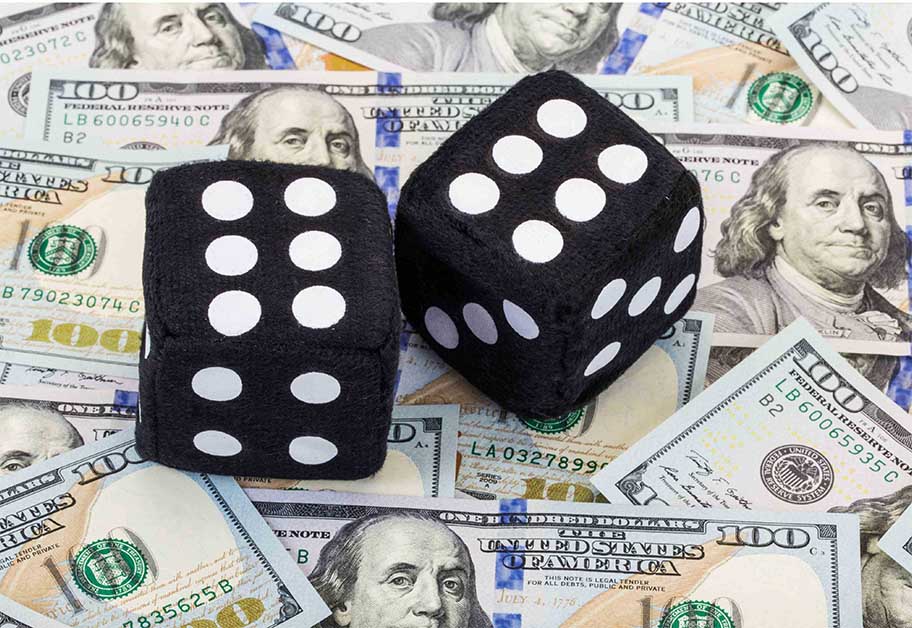What comes to mind when you think of traders or investors who made it big on Wall Street? Maybe some cork-popping excitement on a party yacht? That image isn’t so different from the glitz and glamor of a gambler raking in the chips after a huge win. But as you’ll see, there’s actually a pretty big difference between gambling vs investing.
Gambling vs Investing: 5 Key Differences
- Length of Time
- Information Sources
- Diversification
- Odds of Success
- The Rules of the Game
Gambling vs Investing Definitions
Let’s start by looking at the definition of gambling and the definition of investing so we can compare.
Gambling is defined as wagering something of value on an uncertain outcome with the intention of winning it back (and hopefully more). Investing means allocating money into a venture with the expectation that it will yield a return in the future.
Right there you can see a few key differences. One of which is that when you gamble, you know you could lose. But can’t you also lose when you invest? You can, but your expectations of losing an investment should be far lower than your expectation of losing money to a slot machine.
The truth is, investing and gambling are almost as old as mankind. People have an inherent interest in gambling, and if they didn’t take risks, many would argue that society wouldn’t progress as much.
Has Investing in the Stock Market Turned into Gambling?
There’s been a lot of attention given to the internet culture of meme stocks (stonks), like those tossed about on the WallStreetBets forum. Though the GameStop story seems to be one where retail investors defeated the big hedge funds, generally speaking, a lot of stocks predicted to “go to the moon” have crashed and burned.
Potential investors should not take the sensationalism lavished upon these stories as examples of investing. In fact, in many cases, it’s not even akin to trading.
Trading vs investing is an often-misunderstood topic. In general, investors are in it for long term growth, while traders are primed to capitalize on the ups and downs of stock prices; buying low and selling high. But successful traders are not gambling either. They expect to win because they’ve performed mathematical analysis of the stock market, and know the odds of a favorable outcome. If these odds were not strong enough to merit putting the money where one’s mouth is, these traders wouldn’t do it. By contrast, someone playing Blackjack knows (or should know) that their odds of winning are 42.22 percent.
Those odds don’t sound very good for making money on the stock market, whether you’re trading or investing. But those are the kinds of odds you can run into if you have no idea what you’re doing. An example of this is when thousands of ill-informed retail investors began buying stock in NYSE:ZOOM at the start of the Covid-19 pandemic. Many people assumed they were buying stock in the Zoom company that makes video conferencing software to keep people connected, when they were actually purchasing stock in a Chinese mobile device company.
Gambling vs Investing in the Stock Market: 5 Key Differences
1. Length of Time
How long does it take to press the button on a slot machine and see if you hit the jackpot? How long does it take to spin a roulette wheel? To take a card from a Blackjack dealer? Gambling involves placing a wager on an event, usually one that is imminently before you. Even if it’s a long sports game, you’re going to know whether you won or lost within a few hours. By contrast, investing is something that takes weeks, months, years, and even decades.
We did mention stock trading. These trades involve stock investors capitalizing on the ups and downs of a stock price, sometimes within seconds. As it turns out, length of time is also one of the key differences between day trading and a long term investment strategy. However, that does still not place the activities of a day trader into the category of casino gambling. That’s because there are still quite a few differences between true investing and gambling—even when that investing is day trading.
Infinity Investing Featured Event
In this FREE event you’ll discover how the top 1% use little-known “compounders” to grow & protect their reserves. Our Infinity team of experts show you how to be the best possible steward of your finances and how to make your money and investments work for you instead of you working for them. Regardless of your financial situation today, you’ll have a road map to get to where you want to be.
2. Information Sources
There is nothing you can do to read up on how to outgame a slot machine, other than to know (factually) which casinos and slots are the loosest (meaning which ones offer the best odds of winning). There is not enough complexity to conduct a nuanced study of likely outcomes.
When it comes to stocks, however, there is a lot of information you can look at to determine whether or not you should buy, sell, or hold a particular security—everything from the simple stats displayed on your favorite trading app to a deeper fundamental analysis of a company.
There’s also the Infinity Investing Stock Trading Room, where each week, our financial experts teach investors how to profit from the stock market. It’s a great opportunity to ask questions while learning about new strategies.

3. Diversification
Gambling does not really offer any sort diversification. Sure, you can go to a casino and play slots, blackjack, roulette, and craps, but you can only do one thing at a time.
By contrast, if you invest in stocks, you can have telecom stocks, oil and gas stocks, food stocks, entertainment stocks, and (why not) even casino resort stocks. If one industry is doing poorly, that’s okay, because the others are probably doing fine. In a similar vein, an investor can have money diversified over several asset classes like stocks, commodities, cash, and precious metals. If one is doing poorly, the others make up for its poor performance and balance out the portfolio.
4. Odds of Success
This is a crucial one. What are your odds of winning when you gamble? When you flip a coin, it’s 50-50. When you play roulette, your odds of winning are less than three percent. When it comes to slot machines, your odds are even worse. These machines will always, always be calibrated to make you lose, giving you just enough slack to think you are sometimes winning and stick around.
In other words, there is a calculated interest that makes success improbable.
By contrast, the odds of investing are very positive. Since the S&P 500 index began in 1926, it has seen an overall annual return of 10 percent, even with market crashes and dips over the years. Stocks go up over time. While it’s true that some stocks are riskier than others, there are stable stocks, like Coca-Cola, General Mills, Johnson & Johnson, that have a history of performing well.
5. The Rules of the Game
The price of a stock is based on the value of a share of ownership in that company. This, in turn, reflects the company and its profits, losses, management, and public perception. Some stocks can get wildly inflated, but a quick look at the P/E ratio will tell you if that’s the case.
While there is some debate as to whether or not the rules of Wall Street are stacked to favor hedge funds and institutional investors, an everyday retail investor can certainly piggyback off the growth of the stock market. If you don’t believe us, just try an investing app that facilitates micro investing and see how quickly your rounded change snowballs over the years.
Gambling has rules as well, but the main rule is simple: the house always wins. In investing, when the house wins, the investor wins too.
Bonus Video
What About Professional Gamblers?
You might be wondering about the professional gambler who brings an element of skill to the games of chance they play. While it’s true that informed sports betting and poker have an element of research and skill that can reduce the element of chance and risk, many professional poker players would argue that they play the person, not the cards.
Even so, the risk tolerance in these scenarios is significantly greater than, say, putting a consistent portion of your paycheck into a mutual fund. This is because at the end of the day, the outcome of these events (a poker game, a sporting event) cannot be separated from the pervasive element of chance.
You need cards to play poker, and you often need to draw the right cards to win. And even if you don’t, there is always the risk that other players won’t do what you think they’re going to. By contrast, there is little risk involved in the investment decision to buy individual stocks in a company that’s been around for decades and manufactures goods or provides services that people need and rely on.
Gambling Relies on Chance; Investing Relies on Research
At the end of the day, gambling vs investing can be summarized as this: when you invest in something, whether it’s real estate or the stock market, you own something. When you gamble, you don’t own anything because the money you’ve wagered is on the line until you get it back.
Gamblers also have less recourse to mitigate risk than investors do. Investors can lessen their risk by doing research, diversifying their investments, and taking expert investment advice. A gambler can do nothing, other than play the odds. And while it may seem that a day trader is also just shooting in the dark, they’re not. They’re making informed decisions using market research and complex algorithms. Of course, there are certain forms of gambling where the risk is more mitigated because it involves a larger degree of skill, but at the end of the day, fortunes are won and lost on the felt, guided by nothing other than impartial cards that have no interest in who wins or loses.
If you’re interested in learning how to mitigate your losses by reading facial expressions—well, we can’t help you with that. But if you’re interested in becoming a successful investor with a portfolio backed by solid research and tried-and-true strategies, then consider signing up for a free Infinity Investing membership. There’s nothing to lose—our financial experts are invested in your future!
Infinity Investing Workshop
In this FREE workshop you’ll discover how the top 1% use little-known “compounders” to grow & protect their reserves. This plan isn’t some get-rich-quick vision board. It’s an actionable guide, simplifying the very same processes used by many of the most successful people.
Your path to financial freedom starts here.

